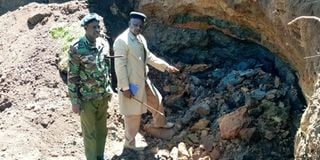The high cost of illegal gold mining in West Pokot

Pokot South Deputy County Commissioner David Boen with Pokot South Sub County Police Commandant (OCPD), Said Shungi examine the extent of environmental destruction at a mining site in Marang’ar area forest river bank on March 27, 2024.
What you need to know:
- Miners put their lives at risk in search of a few grams of gold, with the hope of striking a jackpot.
- The most affected areas are around River Sukut between Tangasia and Kapsangar locations where young boys dropped out of school while young girls got married.
Beneath the hills sitting between Tangasia and Tapach areas in the Marang’ar forest, Pokot South Sub–County, locals gather daily to practice gold mining, mostly during night hours.
Because it is a government forest, others do it secretly during the daytime to escape being nabbed by authorities.
Illegal mining has been expanding in the area over the years, causing environmental pollution of indigenous lands and other protected areas as well as threatening the lives and health of locals.
The biggest risk at the mines is landslides because highland areas of Pokot South Sub County are prone to them.
However, miners continue to disregard the environment and the potential harm caused to both humans and animals. Last year, one person was buried alive in the debris while mining gold.
Locals are also exposed to health hazards, illness, destruction, and other perils.
Miners put their lives at risk in search of a few grams of gold, with the hope of striking a jackpot.
The most affected areas are around River Sukut between Tangasia and Kapsangar locations where young boys dropped out of school while young girls got married.
Mining communities adjacent to mines have lost vast tracts of arable lands, and most farmers have abandoned farming in favour of illegal activity.
Illegal mining activity has also contributed to deforestation which was destroying rivers and water bodies. The cumulative effect has been the loss of arable land for crop production and food insecurity. There are fears that food security will be seriously challenged, and rivers, water bodies, and forests will be lost if illegal mining activities are not halted.

Security officers and residents of Sugut centre in Tangasia sub-location in a meeting to stop illegal mining on March 27, 2024.
Dennis Yarango'le, a resident, says mining activities are moving closer to their homes, posing great risk to families.
“Locals fall sick because of unsafe water and food. Ditches are scattered all over the area. The area has been damaged by miners who dig pits near rivers as they extend their activities downstream. The river has been polluted,” he explains.
Samuel Katumon, Tangasia Location Chief, revealed the extent of the damage done not only to the farmland of residents but also the gross pollution of their water source.
“The activities pose a significant danger to human life and there is a need to stop further illegal mining activity in the area to avert further loss of lives,” he says.
He says there are devastating impacts where few people are taking advantage of surging gold prices and leaving severe environmental degradation in their wake.
“We have experienced a decrease in the quality of the soil and a long-term decline in farming,” said Chief Katumon.
Emmanuel Ting'anur, a survivor of a tragic gold mining incident, recounted his harrowing experience of narrowly escaping death when the gold mine collapsed. He describes the entire ordeal as horrific, emphasising how being trapped in a gold mine leaves one with nothing but hope, prayers, and the agonising wait to either be rescued or face death, entirely dependent on the mercy of the rescuers.
Last week, Pokot South Deputy County Commissioner David Boen issued a directive to stop all illegal gold mining operations in the Marang’ar forest area.

Pokot South Deputy County Commissioner David Boen addressing residents of Sugut centre in Tangasia sub-location to stop illegal mining on March 27, 2024.
He mentioned that they are concerned about the environmental, health, and safety risks linked to the ongoing illegal gold mining activities in the forest area.
He notes that residents have been ordered to stop any further mining in the area until they receive approval from the appropriate government authorities.
The commissioner says the objective of shutting down illegal operations and keeping out miners was to ensure the prevention of incidents leading to death and injuries in mines before they occur.
‘‘During our inspection of the mining sites, we noticed that miners were digging deep holes to extract gold, disregarding the adverse environmental consequences of their activities,’’ Mr Bowen said.
DCC Boen highlighted that the gold mines have not only resulted in an increase in child labour, as children disregard the risks and laws prohibiting work under the age of 18, but also contributed to the occurrence of early marriages.
The ongoing influx of miners in the area has also severely compromised sanitation and hygiene, as miners openly defecate, posing a potential threat of a cholera outbreak.
He encouraged the locals to adopt pyrethrum, potato, and dairy farming as a viable income option.
Pokot South Sub County Police commandant(OCPD) Said Shungi, emphasised that the Tapach area plays a crucial role as a water catchment area while noting that police will not tolerate any illegal mining activities that could harm the region's water source.
‘‘Such activities which lack government approval, will not be allowed,’’ OCPD Shungi said.
Gordon Anyiko, the forest station manager for Lelan ward at the Kenya Forest Service Lelan Division stated that the local community cautioned about the detrimental effects of forest destruction and urged them to actively monitor and report any illegal activities such as mining, charcoal burning, overgrazing, and other unauthorised actions in the forest.





